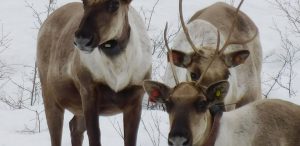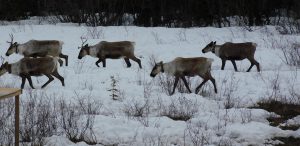Enhancing caribou survival within the Klinse-Za/Scott herds
The goals of this project is to increase the survival rate of cows and calves during the calving period in order to stop, and even reverse, the rapid decline of caribou that inhabit the Klinse-Za and Scott Caribou herd areas. Pregnant cow caribou are captured in early March and relocated to a pen that is located in natural calving range. The cows are fed and protected during the calving season until the calves have grown to a point where they are less susceptible to predation by wolves and bears (late July). The maternal pen project has been a success in its first three years of operation and this project will continue the maternal pen for a fourth year.
Spring 2017 Update
Nine caribou cows were captured in March 2017 and brought to a 6ha pen near Chetwynd. The cows will stay in the maternity pen until the calves are born. When the youngest calf is about six weeks, the cows and calves will be released. This pen is one of several maternity pens that FWCP is funding to help improve calf survival.
Final Report: Executive Summary
The Klinse-Za caribou herd in northern British Columbia is part of the endangered Southern Mountain population of caribou, and has declined in size from 198 animals in 1995 to a low of 16 animals in 2013. The herd suffers from unsustainable levels of predation (mostly by wolves) and was predicted to have become extirpated by 2015. Maternity penning was implemented in 2014 as a measure to avert extirpation of the herd. In combination with wolf removals conducted by First Nations (initiated 2013) and the BC Government (initiated 2015), the pen project has helped to arrest the steep decline in the Klinse-Za population, and the combined Klinse-Za and Scott East caribou herd size has increased from 38 individuals in 2013 to 61 in 2017 (lambda = 1.126). An unexpected outcome of the maternity pen project was the mixing of the Klinse-Za and Scott East herds which, prior to penning, were fairly distinct. Although it is difficult to directly compare the relative benefits of maternity penning and wolf removals, the maternity pen does appear to effectively contribute to population increase. This conclusion was drawn by contrasting adult survival and the number of calves/100cows in the wild with that of the pen after the natal period in early July, and again before the calf recruitment period in mid-March.
The Klinse-Za maternity pen project aligns with the Fish and Wildlife Compensation Program’s Species of Interest Action Plan in that it addresses the outlined Species-based Actions. Specifically, the Action addressed is 1b-3 ‘Implement projects identified through approved recovery strategies, action plans, and management plans developed for woodland caribou’. We address that action in that the project will enhance Woodland Caribou population of the KlinseZa herd as per the “Implementation Plan for the Ongoing Management of South Peace Northern Caribou (Rangifer tarandus caribou pop. 15) in British Columbia”, specifically – 3.5.3 “Species and Population Management to increase the population of South Peace Northern Caribou across the current range, it is essential that species and population management occur in certain herd areas. Species and population management activities will include improving knowledge of South Peace Northern Caribou population estimates and trends, improving knowledge of adult and calf survival, increasing adult and calf survival, and augmenting herds (e.g., maternal penning, transplants)”.
Click the provincial database link below to read the full final report for this project.




